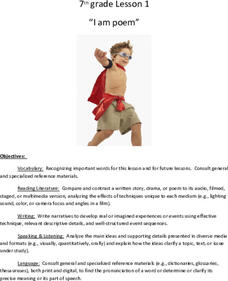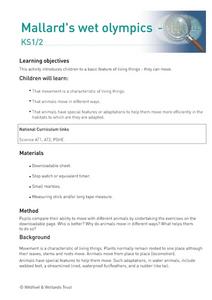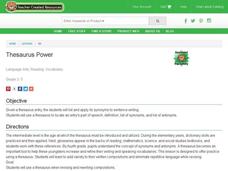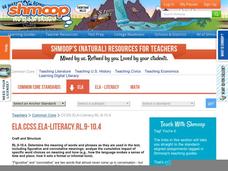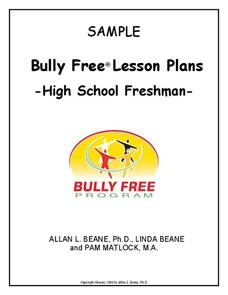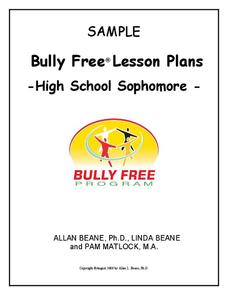Utah Education Network (UEN)
8th Grade Poetry: A to Z Poem
A two-part lesson asks eighth graders first to draw connections between the myth of Aengus and William Butler Yeats' poem "The Song of Wandering Aengus." In the second part of the lesson, writers craft an "A to Z Poem."
Utah Education Network (UEN)
7th Grade Poetry: Ode Poem
Walt Whitman's "Captain, My Captain" and Robert Frost's "The Road Not Taken" provide seventh graders with examples of odes. After reading and discussing these and other examples, young poets craft an ode and respond to the ode of a...
Utah Education Network (UEN)
7th Grade Poetry: I Am Poem
A study of Alfred Noyes's poem "The Highwayman" opens a lesson about narrative poetry. Scholars read the poem and compare it to the animated video version using a worksheet. Learners look at models and use a template to craft an "I Am"...
Curated OER
Pixel Drawings
Middle and high schoolers re-create a magazine photo or other picture and make it into a drawing using pixels. This fun art project should be a hit with your charges! The materials needed to implement the lesson should be easy to get,...
Curated OER
Mallard's Wetland Olympics
Students observe plants and animals of a wetland and then compare their ability to move with different animals by undertaking the exercises on a downloadable page.
National Endowment for the Humanities
The Beauty of Anglo-Saxon Poetry: A Prelude to Beowulf
Riddle me this! What do kennings, caesura, and alliteration have to do with the Nowell Codex? Introduce class members to Anglo-Saxon poetry and prepare readers for a study of Beowulf with a series of activities that...
Curated OER
Keep Your English Up to Date: Chav
Take a look at linguistics and stereotypes in Great Britian with a word study of "chav." Learners find out what terms are pejoratives and what they are meant to convey. Geared toward British culture, study the ever-changing English...
Curated OER
Pet Guess Who
Est-ce que ton animal grand ou petit? Pair up your beginning French speakers for a game of Pet Guess Who! Using pet advertisements from newspapers or the Internet, pairs try to guess what kind of animal their partner has. Also, use the...
Curated OER
What's In Your Bag?
Guess what is in the bag! Use this lesson at the beginning of the year to discuss appropriate items for 4th grade students to have in school. Each group develops a list of appropriate items as well as inappropriate items, and discusses...
Curated OER
Keep Your English Up to Date: Wannabe
Language is a fluid and ever-changing entity! Take a week to cover the changing English expressions and slang as related to the word "wannabe." Go through vocabulary, spelling, worksheets, and quizzes on the topics with your class.
Curated OER
Thesaurus Power
Give your class the advantage of Thesaurus Power! They will use a thesaurus to understand word meanings and relationships. They focus on how a thesaurus functions and how it gives the entry word, definition, synonyms, antonyms, and part...
Curated OER
Understanding and Using Primary and Secondary Sources in History
Explore primary and secondary sources in this historical analysis instructional activity. Young researchers define the terms primary source and secondary source. They read a primary source document provided by the teacher and answer...
Curated OER
Towers and Turrets
A activity on architecture will help young artists consider perspective. Your class will use water colors to paint towers and turrets. You can connect this art activity to famous buildings like the Taj Majal in India, Saint Basil's...
Curated OER
Child Safety
Explore reading comprehension and child safety in this young adult literacy lesson. High schoolers practice using context clues to figure out word meanings after observing a teacher model this process. They read an article about child...
Shmoop
ELA.CCSS.ELA-Literacy.RL.9-10.4
The fourth standard for reading literature in the Common Core calls for young readers to be able to determine the figurative and connotative meanings of words and phrases. Use this resource, a continuation of a series of Common Core...
National Endowment for the Humanities
Kate Chopin's "The Awakening": No Choice But Under?
The first in a series of three resources designed to accompany a reading of Kate Chopin's The Awakening provides readers with background information about Chopin, Creole culture, literary realism, and women's suffrage.
Bully Free Systems
Bully Free Lesson Plans—Seventh Grade
Having a hard time defining bullying with your seventh graders? Discuss the different types of behavior one would see in a bullying situation with a series of lessons, worksheets, and group activities.
Bully Free Systems
Bully Free Lesson Plans—Ninth Grade
"Bullying and Prejudice" and "Do You Cyber Bully," two lessons from a complete Bully Free program, serve as samples of the approach used in a unit designed to bring awareness to and to combat bullying. Each lesson asks class...
Bully Free Systems
Bully Free Lesson Plans—10th Grade
Two lessons, "What Does Cyber Bullying Look Like?" and "Factors Influencing My Reporting the Bullying of Others," serve as examples of the 12 included in a Bully Free curriculum. Each plan includes discussion questions, an activity,...
Bully Free Systems
Bully Free Lesson Plans—11th Grade
It takes courage to stand up to bullies. Two sample lessons from a complete Bully Free curriculum, "Courageous and Brave Bystanders" and "Assertiveness Skills for Bullied Students and Empowered Bystanders" provide participants with...
Bully Free Systems
Bully Free Lesson Plans—12th Grade
Two sample lessons from a curriculum unit on bullying provide high school seniors with an opportunity to assess their online and cell phone behavior and to consider how they can offer support to bullied students. Each plan includes an...
Bully Free Systems
Bully Free Lesson Plans—Eighth Grade
Middle schoolers are likely very familiar with the concept of bullying and cliques. Discuss their experiences and brainstorm ways to handle peer conflict and feelings of exclusion with a poem that focuses on bullying, and a second...
Channel Islands Film
Dark Water: Lesson Plan 3 - Grades 6-12
After watching the documentary Dark Water about a traditional Chumash ceremony and reading a Chumash origin story, viewers are asked to create a coat of arms and to craft an essay that details a family tradition or their own origin story.
Cornell University
Magnetic Mad Libs
Examine the science behind computer communication. After defining the properties of magnets, learners simulate how a computer hard drive works by sending each other binary codes using the magnets. They use these communications to...
Other popular searches
- Dictionary Skills
- Dictionary Skills Lesson
- Acronym Dictionary
- English Dictionary
- Dictionary and Thesaurus
- +Computer +Dictionary
- Dictionary Use
- Elementary Dictionary Skills
- Using a Dictionary
- +Biography +Dictionary
- Dictionary Skills Worksheets
- Dictionary Practice


